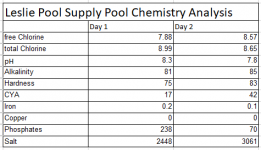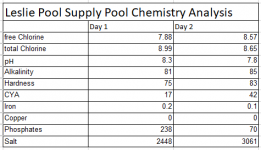I was researching why there was a 4X difference between my Total Chlorine (TC) and Free Chlorine (FC) and after reading several comments about the inaccuracy of test strips on TFP, I decided to do an experiment. While the results shown below, I was concluding that the strips were providing false negative results for FC (that is they were showing a falsely low result). This relies on the assumption that Leslies new pool test (a version of the Lamotte WaterLink Spin Touch which is independently NSF-ANSI 50 Certified test) was calibrated and more accurate than the test strips, which makes sense given the circumstances. Please note, since these tests generally report TC rather than CC, I will be using the same conventions. I am wondering if there is a reason why these results are taking place related to the chemistry of my pool or the chemical nature of the tests?
Background: My FC was maintaining at around 3 ppm for a 20K gallon, fiberglass, new saltwater pool. Despite the anomaly of higher TC, suggesting higher CC, the pool water was clear.
Method/Experiment: Gather sample A & B, on two consecutive days. Test samples with 2 separate testing strips, then test samples at Leslies pool supply store.
Results & Conclusion: Suggest false negative result from test strips. They provide identical results with a TC that is nearly 4x of FC, compared to leslies which shows FC and TC are about the same on both days. Perhaps it is OK to conclude that the results of TC also accurately represent FC under similar conditions given the findings of test strips in comparison to leslies. However, understanding why this result is taking place will let me know what I should plan in the future for routine testing. I would like to have a home kit available to me rather than going to the store each time.

I was thinking it is possible since it is a new pool and some of the chemicals added (or their inactive ingredients) might cross react with test strips for FC? At different points in the past week, I've added sodium hypochlorite, sodium bicarbonate, calcium chloride, cyanuric acid, Sodium Bisulfate as well as hundreds of pounds of sodium chloride.
The remainder of the Leslie's analysis provides more data on the remainder of pool chemistry on these days. Perhaps some of the other chemistry results might have influenced the readings?

Regarding the accuracy of these tests, I contacted Leslies to find the manufacture is Lamaotte. A Lamotte technical support agent confirmed that
a) Leslies is using a branded version of the Waterlink Spin Touch which use Spectrometry for analysis
b) The devices go through independent certification for validation
c) the rep also stated he believes Leslies has only been using the device for a few months (meaning calbiration errors are probably less likely)
NSF Certification

In advance thank you for reading & responding.
Background: My FC was maintaining at around 3 ppm for a 20K gallon, fiberglass, new saltwater pool. Despite the anomaly of higher TC, suggesting higher CC, the pool water was clear.
Method/Experiment: Gather sample A & B, on two consecutive days. Test samples with 2 separate testing strips, then test samples at Leslies pool supply store.
Results & Conclusion: Suggest false negative result from test strips. They provide identical results with a TC that is nearly 4x of FC, compared to leslies which shows FC and TC are about the same on both days. Perhaps it is OK to conclude that the results of TC also accurately represent FC under similar conditions given the findings of test strips in comparison to leslies. However, understanding why this result is taking place will let me know what I should plan in the future for routine testing. I would like to have a home kit available to me rather than going to the store each time.

I was thinking it is possible since it is a new pool and some of the chemicals added (or their inactive ingredients) might cross react with test strips for FC? At different points in the past week, I've added sodium hypochlorite, sodium bicarbonate, calcium chloride, cyanuric acid, Sodium Bisulfate as well as hundreds of pounds of sodium chloride.
The remainder of the Leslie's analysis provides more data on the remainder of pool chemistry on these days. Perhaps some of the other chemistry results might have influenced the readings?

Regarding the accuracy of these tests, I contacted Leslies to find the manufacture is Lamaotte. A Lamotte technical support agent confirmed that
a) Leslies is using a branded version of the Waterlink Spin Touch which use Spectrometry for analysis
b) The devices go through independent certification for validation
c) the rep also stated he believes Leslies has only been using the device for a few months (meaning calbiration errors are probably less likely)
NSF Certification

In advance thank you for reading & responding.
Last edited:



